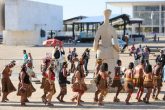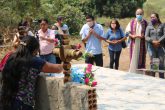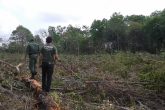About 700 indigenous occupy Brazilian House of Representatives
Indians do not accept the proposal of leaders and occupy the full House
INDIGENOUS APRIL 2013: DECLARATION OF INDIGENOUS NATIONAL MOBILIZATION IN DEFENSE OF INDIGENOUS TERRITORIES
Photo: Cacique Raioni in the Plenary of the Brazilian House of Representatives April 16, 2013
Foto: Zeca Rbeiro (Agência Câmara)
Site: Environmental Racism
Brasil de Fato and BdF photo album on Flicker
(3rd photo is former Minister of the Environment now Senator Marina Silva looking somber)
Approximately 700 indigenous representatives occupy Brazilian House of Representatives
Posted by: Administrator on 16/04/2013.
Source of news: Press Assessor – Cimi
Original posting: https://cimi.org.br/site/pt-br/?system=news&conteudo_id=6803&action=read
Approximately 700 indigenous representatives transferred Indigenous April to an occupation in the Brazilian House of Representatives on the Esplanade of Ministries in the
"We do not accept any type of negotiation or dialogue concerning the PEC 215. What we want is that the Special Committee be dissolved," said Sonia Guajajara, a leader of the APIB (Articulation of Indigenous Peoples of Brazil).
The president of the Camâra, Henrique Eduardo Alves (PMDB / RN) was present in the public hearing after substantial pressure from the indigenous movement. Regarding the claim of the indigenous peoples, he only said he would ask the party leaders to not to nominate representatives to the commission on the PEC 215 until the situation was good for all parties.
"No, President, we do not accept that. Therefore, we remain here (in occupation of the Congress) indefinitely. "
(Photo Credit Wilson Dias / ABr)
Translation: Meg Kidd
***
Indians occupy plenary of Brazilian Parliament
Posted by: Administrator on 16/04/2013.
Source of news: Communications Office – Cimi
By Patricia Bonilha
Brasilia, March 16 – The seven hundred indigenous persons, representatives of 121 peoples from the five regions of Brazil, decided to remain occupying the floor of the House of Representatives. At the time of occupation, the executive secretary of CIMI, Cleber Buzatto, and an indigenous representative arrived to be tasered by the House security. And the press secretary, Renato Santana, was attacked with punches, had his glasses broken and was dragged until receiving help from Representative Jean Wyllys (PSOL / RJ).
The first proposal made by party leaders, after the close of the meeting, was that they committed to not to nominating representatives from the parties for installation on the Special Committee on the PEC 215. This proposal, authored by former Rep. Almir Sa (PPB-RR), intends to transfer from the federal government (União) to the National Congress the authority to approve the demarcation of lands traditionally occupied by Indians and the ratification of the areas already approved.
After the Indians expressed that they already do not accept this proposal because, in fact, it means nothing, [party] leaders pledged not to take any action, that is, not nominate party representatives for seats on the Special Committee for a period of 45 days, so as to open a process of conversation with the indigenous peoples during this period.
Again, the plenary decision [of the indigenous peoples] was to not accept the proposal considering that it means nothing before the great threat posed by PEC 215 for the indigenous people throughout the country With cries of "if it is not revoked, Indians are going to remain, " they reaffirmed the importance of guaranteeing that indigenous rights are to be preserved.
According to Cacique (chief) Marcos Xukuru of Pernambuco, there is no confidence in the word of these leaders, nor in the president of the House of Representatives, Henrique Alves. "They were in a position of giving a concrete decision for us. The answer given is simply a ploy for us to return to our states and in 40 days make the nominations to compose the Special Committee." It also underscores the fact that the response was so superficial that no proposal was presented for how this listening to the indigenous peoples would be done to guarantee this conversation. "That is, we have been given no guarantee, in fact", evaluates the Xukuru chief.
The session taking place in the plenary was suspended.
More information in the CIMI Press Office:
Renato Santana: 61 9979-6912
Patricia Bonilha: 61 8138-7739
Emily Almeida: 61 2106-1666/1667/1670
Translation: Meg Kidd
***
INDIGENOUS APRIL 2013:
DECLARATION OF INDIGENOUS NATIONAL MOBILIZATION
IN DEFENSE OF INDIGENOUS TERRITORIES
Posted by: Administrator on 16/04/2013.
Source of news: APIB / CIMI
Original Posting: https://cimi.org.br/site/pt-br/?system=news&action=read&id=6817
 We, more than 700 representatives of 121 indigenous peoples and various organizations from all Brazilian regions, meeting in the capital Brasília-DF, during the period from April 15 to 19 of 2013, considering the grave threats of regression to which our rights are being subjected that are assured by the Federal Constitution and international treaties such as Convention 169 of the International Labour Organisation (ILO) and the UN Declaration on the Rights of Indigenous Peoples, we declare ourselves mobilized in defense of those rights, principally the sacred right to our lands, traditional territories and natural resources, treated today as objects of avarice, products for the market and resources to be appropriated at any cost by the neo-developmental model prioritized by the current government and the forces of capital that have taken the State by assault, with which there is a pact of governance for the continuity of its political project.
We, more than 700 representatives of 121 indigenous peoples and various organizations from all Brazilian regions, meeting in the capital Brasília-DF, during the period from April 15 to 19 of 2013, considering the grave threats of regression to which our rights are being subjected that are assured by the Federal Constitution and international treaties such as Convention 169 of the International Labour Organisation (ILO) and the UN Declaration on the Rights of Indigenous Peoples, we declare ourselves mobilized in defense of those rights, principally the sacred right to our lands, traditional territories and natural resources, treated today as objects of avarice, products for the market and resources to be appropriated at any cost by the neo-developmental model prioritized by the current government and the forces of capital that have taken the State by assault, with which there is a pact of governance for the continuity of its political project.
This agro-extractive model is highly dependent on exploitation and export of raw materials, especially of commodities agricultural and mineral. To make the model viable, the government seeks to implement, at any cost, infrastructure projects in the areas of transportation and energy generation, such as, highways, railroads, waterways, ports, hydroelectric plants and transmission lines. This presumes and overwhelmingly heightens the potential for dispute for control of territory in the country, and explains the fact that the political-economic sectors, representatives of agribusiness, of mining interests, of the major contractors and of the government itself to join together to advance, with the intent of appropriating and exploiting the indigenous territories, those of the quilombolas, of the peasants, of the traditional communities and the areas under environmental protection.
Objectives of the attack on indigenous territorial rights
The offensive against the indigenous territories by the powerful has the following objectives:
1) to render unviable and to prevent the recognition and the demarcation of the indigenous lands that continue to be usurped, in the possession of non-indians;
2) to reopen and revise procedures for demarcation of indigenous lands that have already been finalized;
3) to invade, exploit and market the demarcated lands, which are in the possession of and being preserved by our peoples.
Instruments utilized to reverse the territorial rights of indigenous peoples
To achieve the objectives to occupy and to exploit the indigenous territories, these economic and political powers allied with sectors of the government and the parliamentary base resort to political-administrative, legal, judicial and legislative instruments, as identified below.
Objective 01 – to render unviable and to prevent the recognition and the demarcation of the indigenous lands that continue to be usurped, in the possession of non-indians.
1) Proposed Constitutional Amendment 215/00 (PEC – Proposta de Emenda Constitucional) authored by Congressman Almir Sá (PPB / RR) admissibility of which was approved by the Commission on the Constitution, Justice and Citizenship (CCJC) of the Câmara dos Deputados (House of Representatives) in March of 2012. The rapporteur, Representative Osmar Serraglio (PMDB / PR), then deputy-leader of the government in the Câmara, appended to this Bill another 11
Unfortunately, on the eve of the commemoration of the Day of the Indian, the president of the House, Representative Henrique Alves (PMDB / RN), authorized the creation of the Special Temporary Committee which is to analyze this malign PEC.
2) Proposed Constitutional Amendment (PEC) 038/99: authored by Senator Mozarildo Cavalcanti (PMDB / RR), which awaits inclusion on the agenda to be voted on by the full Senate. If approved, as the separate vote of Senator Romero Jucá (PMDB / RR), will amend Articles 52, 225 and 231 of the Federal Constitution establishing exclusive authority of the Senate to approve proceedings on the demarcation of indigenous lands.
3) Portaria 2498, authored by the Executive branch. Published on October 31 of 2011, by the Ministry of Justice, determines the summons of federated entities to participate in the procedures for identification and delimitation of the indigenous lands. This Ministerial Directive (Portaria) is based on a misinterpretation, on the part of the Executive, of the Condition (Condicionante) established by the Federal Supreme Court in the judgment of Petition 3388, unique and exclusive to the case of the Land Raposa Serra do Sol, judgment of which has not become final.
4) Visible inoperability on the indigenous land demarcations. The National Indian Foundation (FUNAI) "has no authorization", that is, it is prohibited by the Presidency of the Republic, to create new Working Groups (GT- Grupo de Trabalho) for the land identification and demarcation studies, which reveals a situation of subservience of the Brazilian government to the demands of agribusiness whose representatives have been requesting, in hearings with State Ministers, a moratorium on the demarcations on the pretext of awaiting the decision of the Federal Supreme Court on Petition 3388.
5) Judicialization of demarcations, articulated by the National Confederation of Agriculture (CNA) and the syndicates affiliated with it. The measure incentivizes non-indigenous invaders of indigenous lands to judicially question any and all administrative procedures that address the recognition and demarcation of indigenous lands. The delay in the judgment of these cases by the judiciary has been resulting in even greater delays in the demarcations of indigenous lands.
Objective 02: to reopen and revise demarcation proceedings of indigenous lands already finalized;
1) Ministerial Directive (Portaria) 303: by initiative of the Executive branch, by means of the Attorney General (AGU) published on July 17 of 2012. This Ministerial Directive manifests an interpretation extremely broad, geographic and temporal as to the constraints (condicionantes) as established by the Federal Supreme Court (STF-Supremo Tribunal Federal) in the judgment of the case of Raposa Serra do Sol (Petition 3388), extending the application of these to all indigenous lands in the country and retroactive in their applicability. The ministerial directive states that the procedures already "finalized" are to be "reviewed and rendered appropriate" to its terms.
In addition to this, it determines that to be "reviewed" are the demarcation procedures underway and severe limits imposed on the rights of exclusive usufruct of the peoples over their lands, provided for in the Federal Constitution, and to the application of free, prior and informed consultation as provided for by Convention 169 of the International Labour Organisation (ILO).
The application of Portaria 303/12 is suspended, but due to come into force on the day following the publication of the judgment on the Declaration Motions (Embargos de Declaração) on Petition 3388 by the Supreme Court (STF). A contingent Supreme Court decision that corroborates the terms established by the Ministerial Directive (Portaria), would profoundly amplify the legal and political instability experienced by indigenous peoples and, in practice, would signify the even more grave conflagration of land conflicts involving the possession of indigenous lands, including the reopening of previously settled conflicts.
Objective 03: to invade, exploit and market the demarcated lands, which are in the possession of and being preserved by the indigenous peoples.
1. Decree No. 7.957, authored by the Executive branch. published on March 13 of 2013. Creates the Permanent Cabinet of Integrated Management for Environmental Protection, to regulate the activities of the Armed Forces in environmental protection and amending Decree nº 5.289, of November 29 of 2004. With this decree, "of a preventive or repressive character" was created the Environmental Operations Company of the National Force of Public Safety, having as one of its duties "to provide assistance in the conducting of surveys and technical reports about negative environmental impacts". In practice this signifies the creation of a state instrument for militarized repression of any and all actions of the indigenous peoples, communities, social organizations and movements that decide to position themselves against enterprises that impact their territories.
2. Interministerial Directive (Portaria) 419/11, authored by the Executive Power. Published on October 28 of 2011, regulates the activities of organs and entities of public administration with the objective to streamline the environmental licensing of infrastructure enterprises that affect indigenous lands. In this sense: a) grants derisory term (prazo irrisório) of 15 days for the FUNAI to manifest in relation to a given work that affects indigenous land in the country; b) determines that the government will only consider as Indigenous Land impacted by a particular infrastructure project that which has its boundaries established by the Funai, that is, whose Detailed Report of Identification and Delimitation has been published in the daily official gazettes (Diários Oficiais da União) of the União and the respective federated state. This last point is especially damaging to indigenous peoples – recognizably unconstitutional -, in that it disregards the fact that the administrative procedure of demarcation of indigenous land is an act that is only declaratory of the right of indigenous peoples over their traditional lands. With Ministerial Order (Portaria) 419, to effect the study of impacts caused by project enterprises, the government disregards the existence of the approximately 370 indigenous lands not yet identified and delimited in
3. Draft Bill (PL-Projeto de Lei) 1610/96, authored by Senator Romero Jucá (PMDB / RR). The Draft Bill addresses the exploration and exploitation of mineral resources in indigenous lands, as addressed by Articles 176 and 231 of the Federal Constitution. In the final phase of the legislative process, awaiting the opinion of the Special Committee. Preliminary report released, in the second half of 2012 by Congressman Édio Lopes (PMDB/RR) is extremely malign to the interests of indigenous peoples. If the law is approved in the form of the report in question, among many other problematic aspects, we highlight: a) The peoples will not be permitted the right of veto. With this, the right to free, prior and informed consultation will be transformed into a mere formal act, called "public consultation". The will of the peoples will not have any influence whatsoever on the continuation of mineral exploitation in their own land. In this case including reviving the principle of [imposed] trusteeship (tutela), abominated by the Constitution, by defining that a commission formed by non-indians would decide what is best for the indigenous peoples; b) There is no explicit constitutional safeguard. With this, mineral exploitation will be able to occur in all and in any space interior to the indigenous land. There is no reference whatsoever that prohibits mining of mineral resources undertaken at monuments and historical, cultural, religious, sacred, hunting, collection, fishing or even the homes of the peoples. That, as is evident, presents an incalculable risk to the physical and cultural survival of the peoples.
4. Proposed Constitutional Amendment (PEC) 237/13: authored by Representative Nelson Padovani (PSC/PR) seeks to alter Article 176 of the Constitution, permitting the possession of indigenous lands by rural producers. PEC 237/13 adds a paragraph to the Constitution to determine that the research, cultivation and agricultural livestock production on lands traditionally occupied by indians may occur by concession of the federal government (União), to agribusiness. Awaiting designation of the rapporteur on the Commission on the Constitution, Justice and Citizenship (CCJC) of the House (Câmara dos Deputados).
5. Bill (PL – Projeto de Lei) 195/11: authored by Representative Rebecca Garcia (PP/AM) provides for the institution of a national system of reduction of emissions from deforestation and degradation (REDD +). In flagrant disregard to the constitutional principle that provides for exclusive usufruct of the land by indigenous peoples themselves, the PL selects (elege), among others, the indigenous lands as the object of REDD+ projects. Awaited is the constitution of the Temporary Special Committee of the Presiding Officers of the House of Representatives.
6. Substitution of the Law (Direto) on Compensation/Mitigation: the omission of the Brazilian government in the effecting of public policies, such as health and education, among others, has been influencing scores of peoples to accept projects of exploitation of their territories as a means of obtaining compensations/mitigations to respond to the demands created by the abandonment of the state.
Faced with this grave framework of violations of our rights, principally territorial, we declare in unified voice:
1. We repudiate all of this series of instruments that are political and administrative, judicial, legal and legislative, which seeks to destroy and terminate our rights won through great struggle and sacrifices 25 years ago, by caciques and leaders of our peoples, during the period of the Constituent Assembly.
2. We will not allow retrogressions in the guarantee of our rights, above all if we consider that the number of lands not yet demarcated is still immense. Of the 1046 indigenous lands, 363 are regularized; 335 lands are in some phase of the demarcation procedure and 348 are claimed by indigenous people in
Fonte: Translation: Meg Kidd






